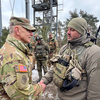Governor sounds alarm, promises plans to fight the COVID surge
ALBANY COUNTY — On Thursday, Governor Kathy Hochul noted the “major jump” in cases since two weeks ago — the Capital Region was listed at 66.57 per 100,000 population as a seven-day average.
“This is an alarm going off,” said Hochul at a press conference in New York City.
She also said that, on Friday, she plans to announce policies to fight the surge expected with cold weather and indoor holiday gatherings.
“Plans are being developed to address the impending surge,” she said.
Hochul cited a report from the Centers for Disease Control and Prevention that found unvaccinated people are 10 times more likely to face hospitalization from COVID-19 than unvaccinated people.
Starting on Thursday, Dec. 9, hospitals statewide with 10 percent or fewer unstaffed beds available had to cease non-essential elective procedures. Their capacity will be reevaluated in mid-January. “We want to be flexible,” said Hochul.
Cancer treatment is still allowed, as is neurosurgery, treatment of intractable pain, transplants, treatment of trauma, cardiac issues with symptoms, limb-threatening vascular procedures, and dialysis vascular access. Also, patients who are at a clinically high risk of harm if their procedures are not completed can be treated at hospitals that are otherwise closed to elective procedures.
The state is allowing out-of-state and out-of-country health-care workers to practice because of the staff shortage. Additionally, National Guard members are working at short-staffed nursing homes so that hospital patients can be discharged there.
On a call with the White House, Hochul said, she learned that 99.9 percent of the cases in the United States are caused by the Delta variant.
The federal government, Hochul said, is quadrupling at-home test capacity and private insurance companies now have to cover costs for those tests.
New York State, Hochul said, has ordered an additional one million tests, which will be distributed to counties to use in schools so that students who have been exposed to the virus can “test to return” to clases. The tests are good for six months, Hochul said.
The state is requiring all schools to issue a vaccination survey to parents. “We want to know what’s going on … to target high-need areas for additional support,” she said.
So far, only 20 percent of 5- to 11-year-olds have received vaccines, Hochul reported.
Statewide, Hochul said, over 500,000 booster shots were administered this week. In the Capital Region, 247,045 people have gotten booster shots.
Hochul gave a shout-out to the National Guard members working at the mass vaccination clinic at Crossgates Mall in Guilderland, reaching the 300,000 mark.
“They’re always there when we need them,” she said of the Guard.
Hochul went over a wide variety of incentives to increase vaccination rates. Two costumed Radio City Rockettes appeared on screen during the press conference to publicize a program in which five vaccination sites will hand out vouchers to be redeemed for tickets to a Rockettes’ production; the first 50 people to get their booster shot at those sites will get the tickets.
Free ski lift passes, free NFL tickets, and free lifetime hunting and fishing licenses are also being used as incentives, and full-paid scholarships are being offered to state colleges and universities.
Lieutenant Governor Brian Benjamin spoke of his statewide travels during which he has been “finding young Black men … have been more resistant” to vaccination as have “Republican-leaning” communities. He says he’s planning conversations to take partisanship out of the equation.
Commissioner’s view
While the state now has 20 confirmed cases of Omicron, the highly contagious COVID-19 variant, New York’s new health commissioner is focusing on more than just emerging strains — concerns like long-haul cases and children’s mental health.
This is the second year of children’s education being interrupted, said Commissioner Mary Bassett at Thursday’s press conference.
While her department is focused on vaccination and booster shots, she said, “There are other ways in which people have to be kept safe.” She has talked with the state’s education commissioner about it.
Bassett also said her department will convene researchers on long-term effects of COVID-19. Her department, she noted, has huge amounts of COVID data.
Getting hospitalized or dying of COVID, she said, are not the only bad outcomes. Having a mild infection, she said, “is not always going to end in a happy way.”
Last month, the Journal of the American Medical Association Network Open released a review of 57 studies, comprising more than 250,000 survivors of COVID-19, showing more than half suffered aftereffects that were prevalent longer than six months after their exposure to the virus.
This included survivors who initially had no symptoms or mild cases as well as patients who had severe cases.
Most prevalent were lung issues, neurologic disorders, mental-health disorders, functional mobility impairments, and general and constitutional symptoms were chest imaging abnormality, followed by difficulty concentrating, generalized anxiety disorder, general functional impairments, and fatigue or muscle weakness. Other frequently reported symptoms included cardiac, dermatologic, digestive, and ear, nose, and throat disorders.
Forty-five of the studies, or 79 percent, came from high-income countries like the United States. The long-term aftereffects “occur on a scale that could overwhelm existing health care capacity, particularly in low- and middle-income countries,” the report said.
Persistent symptoms — lasting more than six weeks — have been reported in 19 percent of fully vaccinated individuals, the report said.
The report recommends “one-stop multidisciplinary clinics … to avoid multiple referrals to different specialists and encourage comprehensive care.”
Omicron
Most of the state’s 20 Omicron cases are in the New York metropolitan area, said Bassett on Thursday afternoon, but there are also cases in the Southern Tier and the Mohawk Valley.
Over half of the states are reporting Omicron cases as are nearly 60 countries, she noted. Many more cases are undetected and the variant is spreading in the community, not just from foreign travel.
The three important questions, Bassett said, for which answers are not yet solid are: Is Omicron more transmissible? Is it more severe? How will vaccination protect against it?
In other countries, she said, Omicron looks to be highly contagious but no more lethal. And current vaccinations appear to offer protection from severe cases and hospitalization, said Bassett.
She stressed, however, that the current uptick in infections is because of the Delta variant, which Bassett termed “overwhelmingly the dominant strain in the United States and around the world.”
“We want people to get fully vaccinated,” she said, which included getting booster shots.
The Food and Drug Administration has just authorized Pfizer-BioNTech boosters for 16- and 17-year-olds and, said Bassett, the Centers for Disease Control and Prevention are expected to recommend it soon.
Currently, any adult who completed getting vaccinated with Moderna or Pfizer is eligible for a booster shot six months after the second shot. Adults who got the one-shot Johnnson & Johsnon vaccine are eligible after two months.
As people plan to gather for the holidays, Bassett urged, “Plan around the most vulnerable.” This includes the elderly and children under 5 who are not eligible for a vaccine. Everyone else should be vaccinated, said Bassett, urging, “Put them in a circle of protection.”
Bassett urged mask-wearing as well as vaccination. “Vaccination is how we protect ourselves,” she said. “Masking is how we protect each other.”
Albany County
Another Albany County resident, a man in his eighties, has died of COVID-19, bringing the county’s death toll to 456, Albany County Executive Daniel McCoy reported in his Thursday morning release on the virus.
He also reported 204 new COVID-19 cases. The county’s five-day average of new daily positive cases is now at 173.4. There are now 751 active cases in Albany County, down from 787 on Wednesday.
On Tuesday, McCoy had announced an advisory that residents should wear masks indoors regardless of vaccination status. There is no enforcement mechanism.
For months Albany County as well as New York State have been labeled places of “high” transmission by the CDC, meaning masks should be worn indoors in public by both vaccinated and unvaccinated people.
The number of county residents under mandatory quarantine increased to 1,339 from 1,328.
There were seven new hospitalizations since Wednesday, and there are now 54 county residents hospitalized with the coronavirus — a net decrease of one. Ten of those hospital patients are now in intensive-care units.
“With over 200 new cases of COVID-19 being recorded in Albany County in just the last 24 hours, it’s clear that we are still feeling the surge of infections after holiday celebrations in November and the colder weather,” said McCoy in the release. “What’s even worse is that today is now the sixth consecutive day I’ve reported at least one new COVID death here, which is now the 11th we’ve had this month.
“We have the weapons in our arsenal to fight back against the pandemic, but we need everyone to work together as a community and do their part to protect each other. I’m urging the public to wear masks indoors and in crowded spaces — regardless of whether you’ve been vaccinated — and to get the vaccine and the booster shot. We also need people to stay home and get tested if they’re feeling sick, and to cough and sneeze into their arms.”
As of Tuesday, 76.1 percent of all Albany County residents have received at least the first dose of the vaccine, and 68.6 percent have been fully vaccinated. The first-dose vaccination rate for county residents 18 and older is at 85.3 percent.
A vaccination clinic is being held on Monday, Dec. 13, from 4:30 to 7 p.m. at Guilderland Elementary School at 2225 Western Ave. in Guilderland. Vaccinations are by appointment only. Scheduling for 5- to 11-year-olds will be handled by individual schools directly with parents of students. For people 12 and older, first, second, and booster shots of Moderna or Pfizer-BioNTech will be offered.



